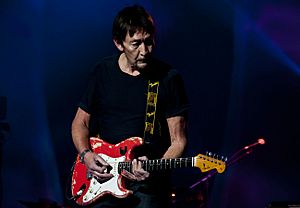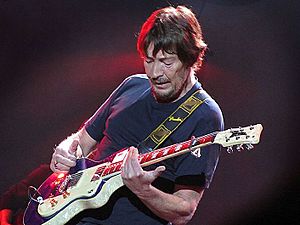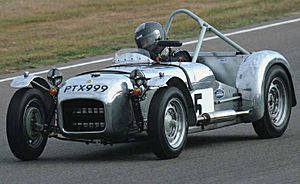Chris Rea facts for kids
Quick facts for kids
Chris Rea
|
|
|---|---|

Rea in the 1980s
|
|
| Background information | |
| Birth name | Christopher Anton Rea |
| Born | 4 March 1951 Middlesbrough, North Riding of Yorkshire, England |
| Died | 22 December 2025 (aged 74) |
| Genres | |
| Occupation(s) |
|
| Instruments |
|
| Years active | 1973–2025 |
| Labels |
|
Christopher Anton Rea (born 4 March 1951 – died 22 December 2025) was an English rock and blues singer, songwriter, guitarist, and record producer. He was famous for his unique, deep voice and his special way of playing the slide guitar. His music often mixed soft rock with blues.
Rea released twenty-five studio albums starting in the late 1970s. After some early success, he became very popular with albums like Shamrock Diaries (1985), On the Beach (1986), and Dancing with Strangers (1987). Two of his albums, The Road to Hell (1989) and Auberge (1991), even reached the top of the UK album charts. He became a major star across Europe.
Many of his songs became hits, including "I Can Hear Your Heartbeat", "Stainsby Girls", "Josephine", "On the Beach", "Let's Dance", and the much-loved Christmas song "Driving Home for Christmas". He was nominated for the Brit Award for British Male Solo Artist three times. Throughout his career, Chris Rea faced health challenges, which later inspired him to focus more on blues music. He released many blues albums on his own record label, Jazzee Blue, like Dancing Down the Stony Road (2002) and the huge 11-CD set Blue Guitars (2005).
Even though he was very successful, Rea chose not to tour much in the United States, preferring to spend time with his family. In the U.S., he was best known for his 1978 song "Fool (If You Think It's Over)", which was a big hit and earned him a Grammy nomination for Best New Artist. Chris Rea sold over 30 million records worldwide.
Contents
Chris Rea's Musical Journey
Early Life and First Steps in Music
Christopher Anton Rea was born on 4 March 1951 in Middlesbrough, England. His father, Camillo Rea, was from Italy, and his mother, Winifred K. Slee, was from Ireland. Chris was one of seven children. His family was well-known in the area for their ice cream factory and cafes.
When he was twelve, Chris helped out in the family business, clearing tables and making ice cream. He had ideas to improve the business, but his father didn't support them. Chris later wanted to be a journalist and studied at St Mary's College, Middlesbrough.
Chris bought his first guitar in his early twenties. He taught himself to play, focusing on a style called slide guitar. He was inspired by blues musicians like Charlie Patton and Blind Willie Johnson. He also listened to Delta blues and gospel blues to develop his unique sound. Chris felt that for many working-class people, music was a main way to be creative. He wished he had started music earlier, but he found his own path.
Starting a Career: Bands and First Hits
In 1973, Chris joined a local band called Magdalene. He started writing songs for them and became the singer when their original singer didn't show up. Later, he formed a band called The Beautiful Losers, which won an award for Best Newcomers in 1973.
Chris then signed a solo record deal with Magnet Records. He released his first single, "So Much Love," in 1974. His debut album, Whatever Happened to Benny Santini?, came out in 1978. The title "Benny Santini" was a stage name his record label suggested, thinking his real name wasn't "croony" enough.
The album's main song, "Fool (If You Think It's Over)", became a huge hit in the United States. It reached No. 1 on the Adult Contemporary chart and earned Chris a Grammy nomination. This success made him a big artist for Magnet Records. However, Chris felt the record company tried to make him a piano-playing singer, rather than the guitar player he truly was. He always preferred to be seen as a musician, not a "rock star."
Finding His Sound: European Success
After some early albums, Chris Rea's music began to truly show his own style from 1983 onwards. He started working with producer David Richards, and his fifth album, Water Sign, became very popular in Europe. The song "I Can Hear Your Heartbeat" was a hit across the continent.
This success helped Chris build a strong fan base, especially in West Germany. He believed this audience saved his career because they focused on his music, not just his image. His albums Shamrock Diaries (1985), On the Beach (1986), and Dancing with Strangers (1987) sold millions of copies. Songs like "Stainsby Girls" and "Josephine" (written for his wife and daughter) became very popular.
By 1987, Chris was able to pay off his debts to the record company. He signed with Warners, and his "Dancing with Strangers" world tour sold out large venues. Despite offers to tour America, he chose to stay closer to his family.
Chart-Topping Albums and Hit Songs
Chris Rea's next album, New Light Through Old Windows (1988), was a collection of new versions of his older songs. It sold over a million copies and included a re-recorded version of his popular song "Driving Home for Christmas".
His tenth studio album, The Road to Hell (1989), was a massive breakthrough. It became his first No. 1 album in the UK and sold millions. The song "The Road to Hell (Part 2)" was his first UK Top 10 single. In 1991, his album Auberge also reached No. 1 in the UK. The song "Auberge" was a UK Top 20 hit.
Even at the height of his fame, Chris Rea avoided the spotlight. He preferred making music to being a "rock star." He released more successful albums like God's Great Banana Skin (1992) and Espresso Logic (1993), which included the hit "Julia", named after his second daughter. In 1994, a compilation album, The Best of Chris Rea, also reached the Top 3 in the UK.
Facing Challenges and Returning to the Blues
Chris Rea faced significant health challenges throughout his life. In the mid-1990s, he experienced serious stomach issues. Later, in 2001, he underwent major surgery for a severe illness. These experiences deeply changed his outlook on life and music. He realized he wanted to return to his musical roots: the blues.
To do this, he started his own record label, Jazzee Blue. This allowed him to make the music he truly loved, free from the expectations of larger record companies. His first album on this label, Dancing Down the Stony Road (2002), was very successful.
In 2005, he released his most ambitious project: Blue Guitars. This was a huge box set of 11 CDs with 137 blues-inspired songs. Each album cover featured one of Chris Rea's own paintings. He said that his illnesses gave him the chance to finally make the music he had always wanted to create.
Later Years and Legacy
Chris Rea continued to release blues albums and tour in Europe. In 2008, he released The Return of the Fabulous Hofner Bluenotes, a three-CD set dedicated to 1960s Höfner guitars, which also included a book of his paintings. He toured extensively, and parts of his shows were released as a live DVD and album.
In 2011, he released the Santo Spirito Blues box set, which included two films he wrote and directed, along with music from them. In 2016, he faced another health setback, which affected his speech and movement. He worked hard to recover and continued his musical journey.
In 2017, he released his twenty-fourth album, Road Songs for Lovers, and went on a European tour. During this tour, he collapsed during a performance but recovered. In the following years, several special deluxe editions and compilations of his work were released, looking back at his long career.
Chris Rea passed away in hospital on 22 December 2025, at the age of 74, after a short illness.
Chris Rea's Guitars and Films
His Favorite Guitars
Chris Rea's first guitar was a Höfner V3. He played it for many years, especially for slide guitar. The guitar most people linked with him was a 1962 Fender Stratocaster, which he called "Pinky." He bought it after seeing a concert by one of his inspirations, Ry Cooder. After 2002, his main guitar became an Italia Maranello, which he named "Bluey."
His Work in Film
One of Chris Rea's childhood dreams was to write films and film music. He wrote the music for the 1993 film Soft Top Hard Shoulder. He also wrote and produced the 1996 film La Passione. This film was partly inspired by his childhood love for motor racing and Formula One cars, especially Ferrari. He also acted in a comedy film in 1999. Later, he made two more films for his Santo Spirito Blues project, mainly to create music for them.
Chris Rea's Personal Life
Family and Hobbies
Chris Rea was married to Joan Lesley, whom he met as a teenager. They had two daughters, Josephine and Julia, and he named songs after both of them. Chris lived in Cookham, Berkshire, where he owned a recording studio. When he wasn't making music, he loved painting and reading. He once said that journalism was his first passion, and he wanted to write about car racing.
Love for Cars and Racing
Chris Rea was a big fan of historic motor racing. He owned and raced several classic cars, including a Ferrari Dino and a 1955 Lotus 6. He even took part in a special racing event in 1993. He sold one of his racing cars, a Caterham 7, in 2005, and all the money went to a children's charity, NSPCC. He also worked on restoring a replica of a Ferrari Formula One racing car for 22 years. He even got to be a pit lane mechanic for the Jordan Formula One team at the 1995 Monaco Grand Prix. He wrote a song called "Saudade" as a tribute to the famous Formula One champion Ayrton Senna.
Views on Society
Chris Rea believed that politicians and governments sometimes lost touch with everyday people. He was cautious about the idea of a united Europe, thinking that forcing different people to live together might not work, similar to what happened with the breakup of Yugoslavia.
Chris Rea's Legacy
Chris Rea's passing led to many tributes from around the world. People remembered him as a "Teesside icon" who helped put his hometown of Middlesbrough on the map.
Music critics praised his unique talent. Neil McCormick from The Daily Telegraph said any musician would be proud to write songs as beautiful as his. Alexis Petridis of The Guardian noted how Chris often disagreed with record companies and fame itself, but this struggle helped create both his popular hits and his raw blues music. He was seen as a gifted artist who could make both pop-friendly songs and deep blues.
Many described him as a "silent master" and an "antistar" because he stayed humble and avoided the usual rock star lifestyle. Critics from Germany, Croatia, and Spain highlighted that he was a serious musician and a great guitarist, often misunderstood as just a soft rocker. They believed his best work came when he explored his blues roots.
Francesco Fusi of Forbes Spain said Chris Rea's music was a special mix of rock, pop, and blues, and that his legacy was built on honest, recognizable work. Hungarian singer Charlie emphasized Chris's modesty and kindness, noting his huge influence on many musicians. Jon Harper of Blues Rock Review in 2025 concluded that Chris Rea's blues rock work, especially Blue Guitars, is an underrated part of his legacy and deserves more attention.
Discography
Studio albums
- Whatever Happened to Benny Santini? (Magnet, 1978)
- Deltics (Magnet, 1979)
- Tennis (Magnet, 1980)
- Chris Rea (Magnet, 1981)
- Water Sign (Magnet, 1983)
- Wired to the Moon (Magnet, 1984)
- Shamrock Diaries (Magnet, 1985)
- On the Beach (Magnet, 1986)
- Dancing with Strangers (Magnet, 1987)
- The Road to Hell (WEA, 1989)
- Auberge (EastWest, 1991)
- God's Great Banana Skin (EastWest, 1992)
- Espresso Logic (EastWest, 1993)
- La Passione (soundtrack, EastWest, 1996)
- The Blue Cafe (EastWest, 1998)
- The Road to Hell: Part 2 (EastWest, 1999)
- King of the Beach (EastWest, 2000)
- Dancing Down the Stony Road/Stony Road (Jazzee Blue, 2002)
- Blue Street (Five Guitars) (Jazzee Blue, 2003)
- Hofner Blue Notes (Jazzee Blue, 2003)
- The Blue Jukebox (Jazzee Blue, 2004)
- Blue Guitars (Jazzee Blue, 2005)
- The Return of the Fabulous Hofner Bluenotes (Jazzee Blue, 2008)
- Santo Spirito Blues (Jazzee Blue, 2011)
- Road Songs for Lovers (Jazzee Blue, 2017)
- One Fine Day (Rhino, limited release, 2019)
See also
 In Spanish: Chris Rea para niños
In Spanish: Chris Rea para niños
 | John T. Biggers |
 | Thomas Blackshear |
 | Mark Bradford |
 | Beverly Buchanan |




